The 20 Baht banknotes have little change many times. All types of them are as follows.
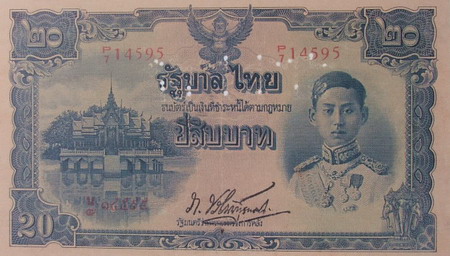
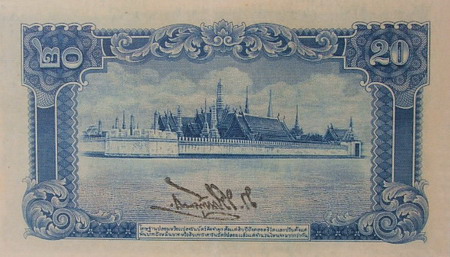
20 Bath type 1 the lower left is Thai number and Thai alphabet.
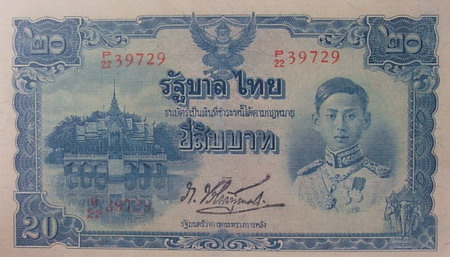
20 Baht type 2 change the number at lower left to Arabic.
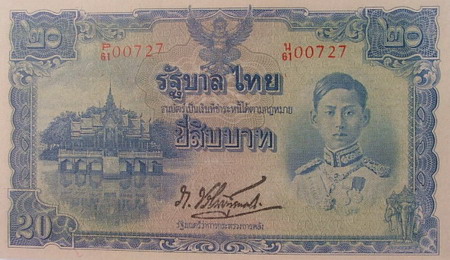
20 Baht type 3 delete lower left serial number and change the upper right alphabet to Thai.
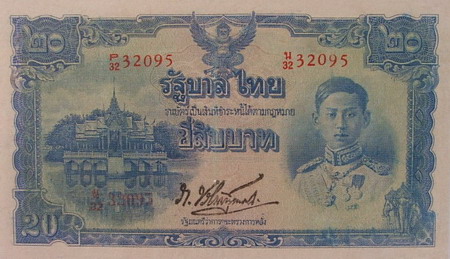
20 Baht type 4 only code P31 P32 and P33 identical to type 3 with additional serial number at lower left.
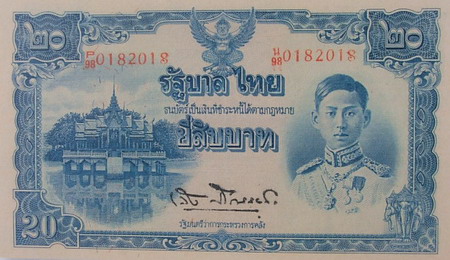
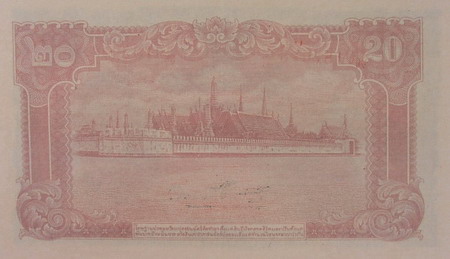
20 Baht type 5 identical to type 3 but change serial number to 7 digits and change the color of the back side to orange.
Appraisal price
The price was updated on 11th December 2017.

Banknote Info
During the World War 2, Thai government had the banknote shortage problem because there was no delivered banknotes from Thomas de la Rue due to England was at war with Japan. The Thai government requested Japan to arrange the banknote printing. The Mitsui Bussan Kaisha Company was commissioned to act as an agent to contact the Japan Printing Bureau.
The banknotes later were different from those of early batches because Japan was heavily attacked by the Allies towards the end of the war thus causing shortage in raw materials.
For the sea transportation, the first shipments were directly to the port in Bangkok. Later heavier attacked by the Allies, the delivered bypass to Singapore then transported to Bangkok by train. In one shipment, the train arrived to Ta Chang station at Surattani, some boxes of banknotes were stolen. 74,000 of 5 Baht, 224,000 of 10 Baht, 72,000 of 20 Baht and 40,968 of 100 Baht banknotes were pushed by feet from the train. Then the stolen notes were found in circulation with forged signature printed, The Ministry of Finance announced on 24th August 1946 that those notes were illegal. Anyway one those could show evidence of honesty would be accepted. So those illegal notes were so-called Thai Teeb (pushing by Thai's feet) notes and Leng ta Chang (the Minister Leng's signature printed at Ta Chang) notes.
The 5th series 20 Baht type 1 banknotes were announced on 18th August 1942.
The 5th series 20 Baht type 2 banknotes were announced on 28th Novemberl 1942.
The 5th series 20 Baht type 3 banknotes were announced on 24th Febrauary 1944.
The 5th series 20 Baht type 4 banknotes were announced on 3rd July 1944.
The 5th series 20 Baht type 5 banknotes were announced on 5th March 1945.
Banknote size
9.00 x 15.50 cm.
Front
The main object is the image of King Rama 8 on the right. The left is the image of the Aisawan Tipaya-ast Pavilion. The middle is the "Thai Government" on guilloche design. The serial code and number were printed with red ink. The watermark image is the constitution on pedestal tray.
Back
The main object is the Anandasamakom Throne Hall.
Signatures on banknote
Minister of Finance
 General Pao pianlert Boripanyutakit (17 Dec 1941 - 1 Aug 1944)
General Pao pianlert Boripanyutakit (17 Dec 1941 - 1 Aug 1944)
 Mr. Kuang Apaiwong (2 Aug 1944 - 10 Jan 1945)
Mr. Kuang Apaiwong (2 Aug 1944 - 10 Jan 1945)
 Mr. Leng Srisomwong (10 Jan 1945 - 31 Aug 1945)
Mr. Leng Srisomwong (10 Jan 1945 - 31 Aug 1945)
